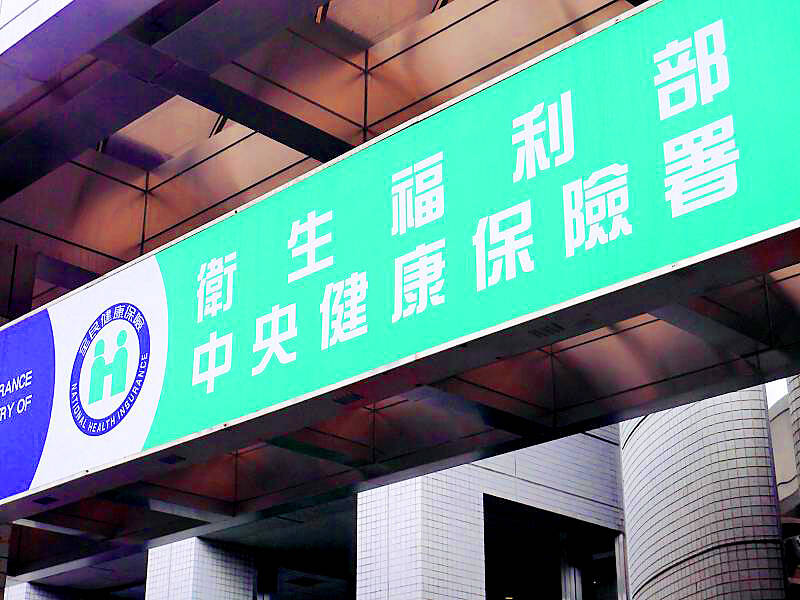There is no evidence that three current and former employees stole data amid a probe launched by prosecutors into the National Health Insurance (NHI) system, the National Health Insurance Administration (NHIA) said yesterday.
The suspects — an NHIA division chief surnamed Hsieh (謝), an NHIA employee surnamed Lee (李) and a retired NHIA chief secretary surnamed Yeh (葉) — are being investigated for allegedly collecting and leaking the personal data of government officials responsible for national security affairs.
Due to the nature of their work, Hsieh and Lee have used their clearance to search and look for the personal data of multiple people stored on the NHI system for more than a decade, the administration said.

Photo: Lin Hui-chin, Taipei Times
During this period, records show that the two logged into the system to search for 133,000 and 35,000 entries respectively, but no evidence was found that indicated they collected and leaked such data, it said.
Yeh never had access to the system when he was employed at the NHIA and therefore there is no record of him searching any data, it said, following an internal administrative inquiry launched separately by the NHIA in the wake of the probe.
All three were brought to the Taipei District Prosecutors’ Office for questioning early last week in relation to alleged breaches of the National Intelligence Services Act (國家情報工作法).
The investigation was initiated after prosecutors received a tip-off that Hsieh and Lee allegedly used their clearance as NHIA employees to collect and leak the personal data of government officials responsible for national security affairs from 2009 to last year.
Yeh is alleged to have instructed the other two to steal the information over a 13-year period, prosecutors said.
A preliminary investigation by prosecutors found that Lee logged into the NHI system on multiple occasions to look for personal data belonging to officials from the Criminal Investigation Bureau of the National Police Agency and intelligence officers in national security agencies.
Hsieh searched about 100,000 personal entries of people stored in the NHI system between Aug. 3 and Aug. 8 in 2018, said Tsai Hsiu-ching (蔡秀卿), director of the NHIA’s ethics office.
However, the NHIA was aware of Hsieh’s activity during this period, likely for the purpose of statistical analysis, and not deliberately targeting officers working in national security agencies, Tsai said.
There is no evidence that these data were copied onto an external storage drive, she said, adding that the information gathered would be provided to prosecutors to aid their investigation.

The Chinese military has built landing bridge ships designed to expand its amphibious options for a potential assault on Taiwan, but their combat effectiveness is limited due to their high vulnerability, a defense expert said in an analysis published on Monday. Shen Ming-shih (沈明室), a research fellow at the Institute for National Defense and Security Research, said that the deployment of such vessels as part of the Chinese People’s Liberation Army (PLA) Navy’s East Sea Fleet signals a strong focus on Taiwan. However, the ships are highly vulnerable to precision strikes, which means they could be destroyed before they achieve their intended

The Taiwan Experience Education Program (TEEP) has funded short-term internships in Taiwan for more than 4,500 young people from more than 40 countries since 2015, with the goal of attracting and retaining international talent, the Ministry of Education said yesterday. Fifty-five colleges launched 514 projects this year, including in fields such as semiconductors, artificial intelligence, medicine and biotechnology, green energy, and sustainability, it said. The program provides research and practical internships in Taiwan for two to six months, and offers cultural exchange and networking opportunities, the ministry said. For example, National Formosa University’s Embedded System and Autopilot Laboratory developed two solar-powered drones in

GLOBAL: Although Matsu has limited capacity for large numbers of domestic tourists, it would be a great high-end destination for international travelers, an official said Lienchiang County’s (Matsu) unique landscape and Cold War history give it great potential to be marketed as a destination for international travelers, Tourism Administration Director General Chen Yu-hsiu (陳玉秀) said at the weekend. Tourism officials traveled to the outlying island for the Matsu Biennial, an art festival that started on Friday to celebrate Matsu’s culture, history and landscape. Travelers to Matsu, which lies about 190km northwest of Taipei, must fly or take the state-run New Taima passenger ship. However, flights are often canceled during fog season from April to June. Chen spoke about her vision to promote Matsu as a tourist attraction in

Taipei resident Mu Chu-hua caught some glimpses of China’s mighty military parade on YouTube on Wednesday. As she watched hypersonic missiles roll down Beijing’s Changan Avenue and troops march in lockstep, she did not feel like they posed a threat to Taiwan. Mu, a 69-year-old retiree, said she saw the parade as simply a way for Chinese President Xi Jinping (習近平) to “say thank you to the troops.” “I thought it was quite normal,” she said. “It was very cool.” China’s military parade commemorating the end of World War II was being watched internationally for insights into Beijing’s military advances and its show